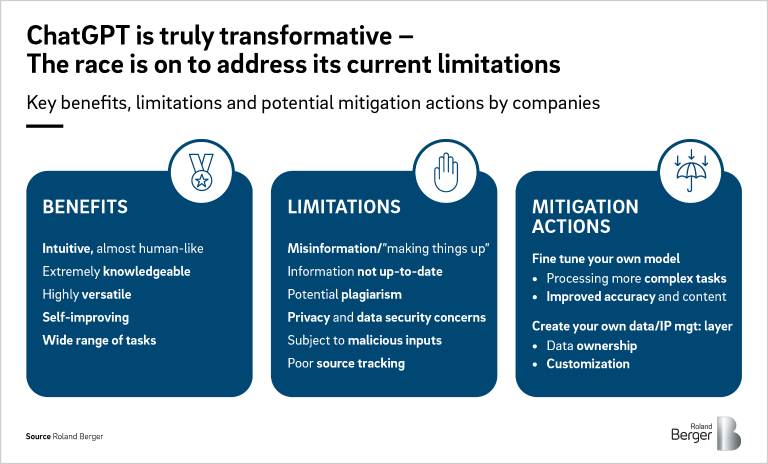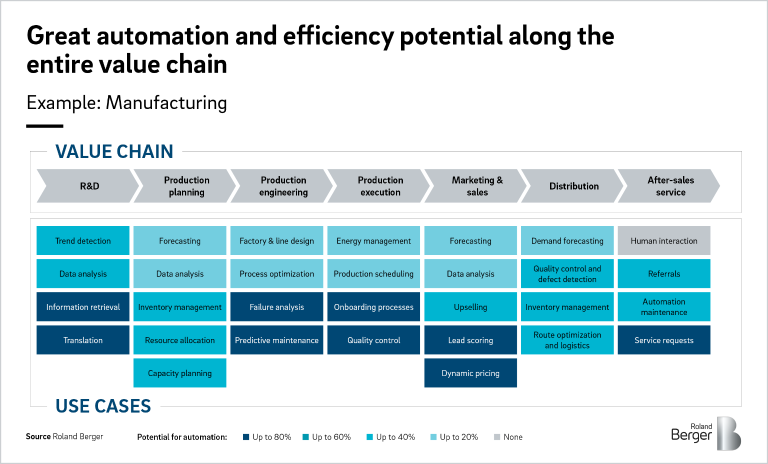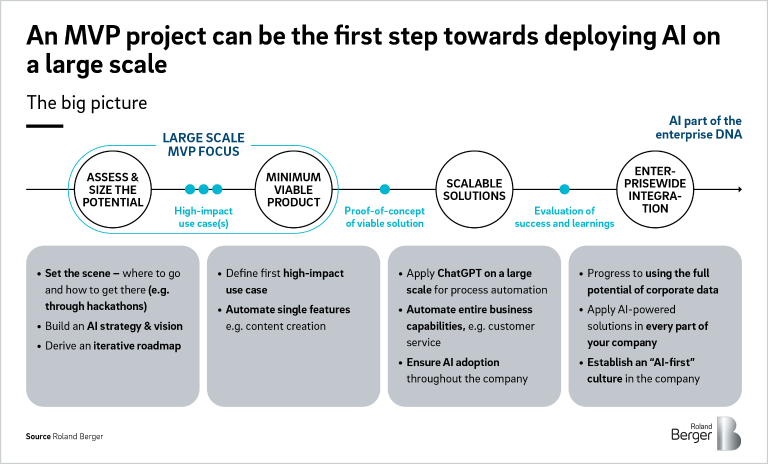Digital transformation can be a complex process. Roland Berger can guide you through each aspect - and unlock your organization's full potential.


ChatGPT: A game changer for artificial intelligence?
By Jochen Ditsche and Manuel Schieler
ChatGPT’s strategic implications for industry, and how companies can harness its full potential
ChatGPT is the topic on everyone's lips. What can it do? How does it do it? And is my job safe? We take a closer look at this revolutionary generative artificial intelligence and analyze what it can (and cannot) do. In particular, we focus on its impact on business and ability to transform a wide range of activities along your value chain. Given its significant capabilities, top managers would be ill advised to bury their heads in the sand. Generative AI needs to be addressed – so you can harness its potential for your business.

The launch of ChatGPT in November 2022 caused something of a storm. Just three months later, the website was enjoying around one billion visits a month and 25 million visitors a day. These shockwaves are still being widely felt across the business world.
ChatGPT is perhaps the best of the artificial intelligence (AI) chatbots released to date. It quickly went viral because of its unique characteristics, especially its human-like, intuitive answers, its knowledge and its versatility. Of course, it still demonstrates certain limitations, such as the information it draws on not being completely up-to-date and its poor tracking of sources. But the race is now on to overcome these deficiencies, and the true potential of what ChatGPT can do remains unknown.
"As knowledge and technology increasingly become commodities, companies must adapt to change much faster than in the past. That means instilling new mindsets in the workforce, building digitally native products, scaling modern engineering teams and nurturing innovation within the organization."
ChatGPT is an example of generative AI, which uses deep-learning algorithms to create novel content, ranging from text and images to music and 3D models. This technology has made rapid progress in recent years.
Not only does generative AI offer clear benefits across the entire value chain, it also has the potential to disrupt a wide range of sectors – including the tech industry. Top managers must address its potential as a matter of urgency or face the dire consequences of being left behind by their competitors.
A wide range of use cases
Apart from creating content, design, music and the like, ChatGPT can have a great impact on automating tasks and reducing costs for companies. It is particularly useful in areas such as data analysis, pattern recognition and predictions, leading to improved decision-making and problem-solving.
In manufacturing, for example, generative AI has automation and efficiency potential along the entire value chain. It can transform trend detection and data analysis, as well as information retrieval and translation to improve R&D. In production planning it can help with inventory management, resource allocation and capacity planning. At the other end of the value chain, in aftersales service, it can transform referrals, automation maintenance and service requests. The extent of its impact in each of these areas varies, as shown in the illustration below, depending on the area's potential for automation. But its transformative power is unquestionable.
Implementing generative AI in your business
How, then, should companies be reacting? How can they implement generative AI solutions in their operations? Critically, they should first focus on evaluating their specific needs and goals. These will vary from company to company and industry to industry. On this basis, the company can then select the right AI tools and platforms, integrating them into existing workflows.
In many cases, a minimum viable product (MVP) project will be the first step in deploying generative AI on a large scale. The four-stage process depicted below shows how companies can grasp the bigger picture and make generative AI part of their DNA. At the same time, it is vital for firms to upskill their workforce to harness the full potential of AI – including collaboration between humans and machines for optimal results.
Businesses will find it difficult, if not impossible, to scale up the use of generative AI in their operations unless they build the right foundations. This means putting a comprehensive data strategy in place, supporting a scalable organizational and team structure, and providing a framework and company-wide guidelines to encourage data-driven use cases.
The company's organizational setup should balance centralization and decentralization, which is crucial for organizing data and advanced analytics activities. As yet, there is no universally accepted standard approach here. In terms of analytics roles and team setup, they will need close collaboration between the business and IT teams, along with dedicated resources for scaling and deployment. For use cases, a prioritization tool will help enhance the current roadmap by optimizing existing processes and identifying areas for improvement.
Urgent action needed
To stay competitive in today's rapidly evolving business landscape, companies must adopt generative AI technologies as a matter of urgency. Lagging behind here runs the risk of reduced efficiency, increased costs and lost market share. With ChatGPT we have, for the first time, a generative AI application that can be easily deployed at a reasonable cost, potentially leading to a large boost in productivity.
Whether it is ChatGPT or another application that eventually wins the race, the real issue is how well companies integrate the new technology and stay competitive in the new business reality. Generative AI is first and foremost a strategic topic. Top management must ask themselves how it affects their competitive advantage, where the low-hanging fruits for efficiency improvements are, which core competencies they must retain and which must be enhanced, as well as how they can further develop their business strategy model. That will put them ahead of the game.
To discuss the impact of generative AI on your industry and how you can make it part of your company's DNA, please reach out to one of our experts below.
Sign up now to receive regular insights on digital transformation and value creation via e-mail.








